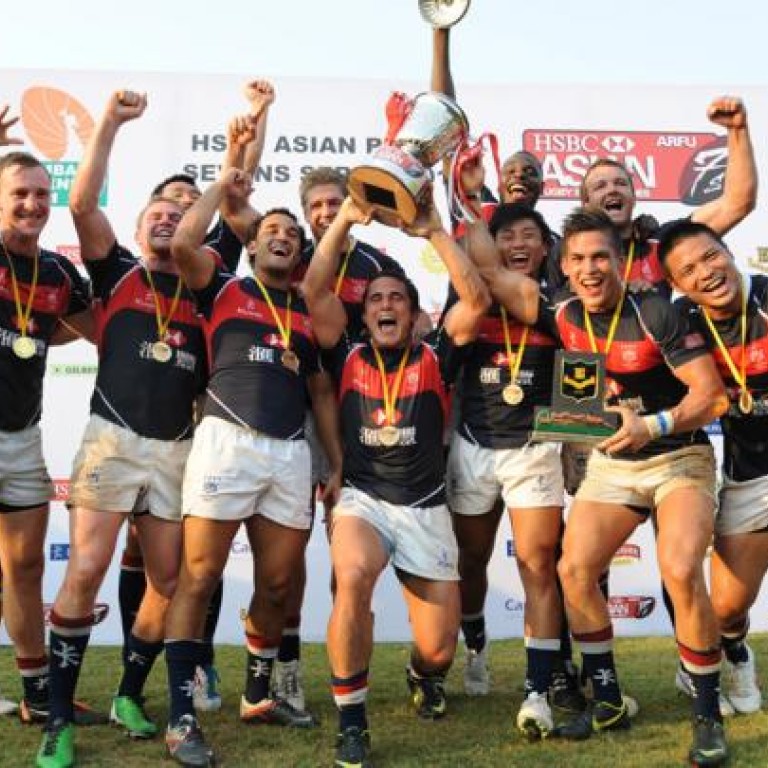
Left field: Let's put rugby eggs in one basket
As Asian champions, Hong Kong should devote more resources to developing the sevens game and let 15s take a back seat
At last, champions of Asia. Even if it is only seven-a-side rugby, Hong Kong's triumph at a former bastion of British colonialism, the Bombay Gymkhana Club, last Sunday is long overdue. Once an exclusive British-only club which has the distinction of hosting India's first test cricket match in 1933, the Bombay Gymkhana will go down in Hong Kong rugby history as venerated soil, for it was there that Japan's imperious reign as Asian champions ended. One of the premier sporting arenas in Mumbai, India's financial capital, will now be known forever as Japan's Waterloo.
"The monkey is off our back," said Brian Stevenson, president of the Hong Kong Rugby Football Union. Indeed. For so long Japan have been our tormentors, defeating us in many close battles over the past few years, starting with the agonising gold-medal loss at the 2009 East Asian Games right here in So Kon Po.
A year later Japan vanquished Hong Kong, who played with six men for most of the game, on a bigger stage, winning the gold medal at the Asian Games in Guangzhou. Then at this year's Hong Kong Sevens, the hosts once again saw their hopes of qualifying as a core team in the HSBC Sevens World Series dashed by Japan, once again playing with only six men after Keith Robertson was red-carded in the first minute of the game for a dangerous tackle.
History seemed to keep repeating itself when, at the first leg of this season's HSBC Asian Sevens Series, Hong Kong lost to Japan in the final of the Borneo Sevens. Yes, needless to say, we were down to six men at one stage. Losing a player in sevens is like playing with one arm tied behind your back.
The Diaoyu Islands spat resulted in Japan missing the second leg of the series in Shanghai. Hong Kong duly went on to win that tournament, defeating China in the final. However, in fairness to Japan, the Asian Rugby Football Union decided it wouldn't penalise them for staying away due to security worries, and came up with a scoring system that effectively meant the winners of the third and last ranking leg in Mumbai - if Japan and Hong Kong reached the final - would be crowned Asian champions.
Hong Kong hammered Japan 28-7. The boot was on the other foot this time with the Japanese down to six men in the second half and Rowan Varty and his men romped to a landmark win.
What does this victory mean for Hong Kong? For starters, it will ensure we play with the 15 core teams at next year's Hong Kong Sevens. It is also taken for granted we will take part in the London Sevens, the qualification event to decide which three teams will be promoted to core-team status - and the chance to play in all nine legs of the world series.
The International Rugby Board has vaguely suggested that five teams from the pre-qualification tournament in Hong Kong will join the three bottom-ranked core teams after round eight of the series, at the London Sevens qualifiers to decide who will win promotion for the 2013-14 season. It is presumed Hong Kong, as Asian champions, will be one of the five advancing from the pre-qualifying tournament here, despite not actually playing in it as they will be rubbing shoulders with the big boys in the top-tier competition.
Hong Kong coach Dai Rees said the Mumbai victory had been "two to three years in the making". Local rugby must be thankful for having a structured tournament. This Asian series has grown wings and will be expanded next year to a fourth ranking event - this year's fourth tournament, next month's Singapore Sevens, serves as a qualifier for the World Cup Sevens and has taken on huge significance.
The Asian series is now used to decide which three teams are invited for the Hong Kong Sevens and it provides all countries much-needed competition on an annual basis. Most other sports have to wait until the quadrennial Asian Games or biennial Asian championships for their dose of international competition. Not rugby sevens.
And this has led to the game now being on the verge of entry into the Hong Kong Sports Institute as an elite sport. Which begs the question: Is sevens the way to go for Hong Kong? We have proved we can be the best in Asia, something we struggle to do in 15s rugby.
With the Olympics now embracing rugby sevens, is this the path the local game must take, especially considering our limited player resources? Last Sunday's triumph at the Bombay Gymkhana certainly points in that direction.

